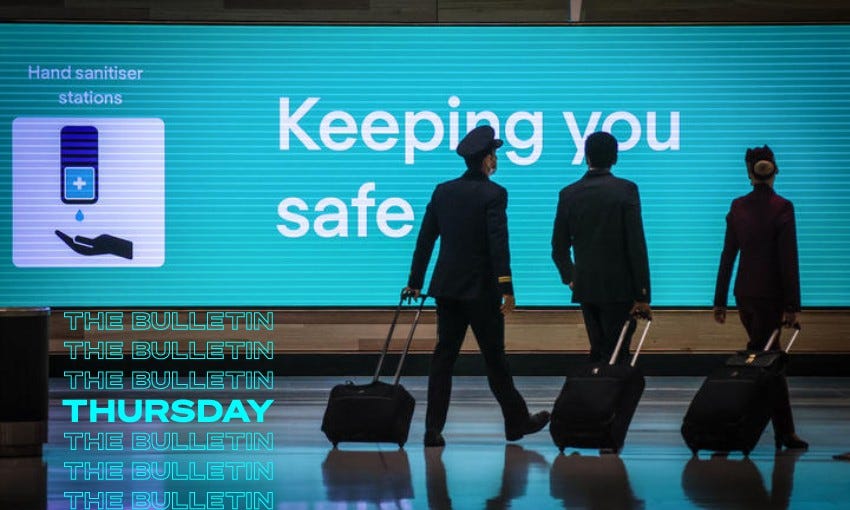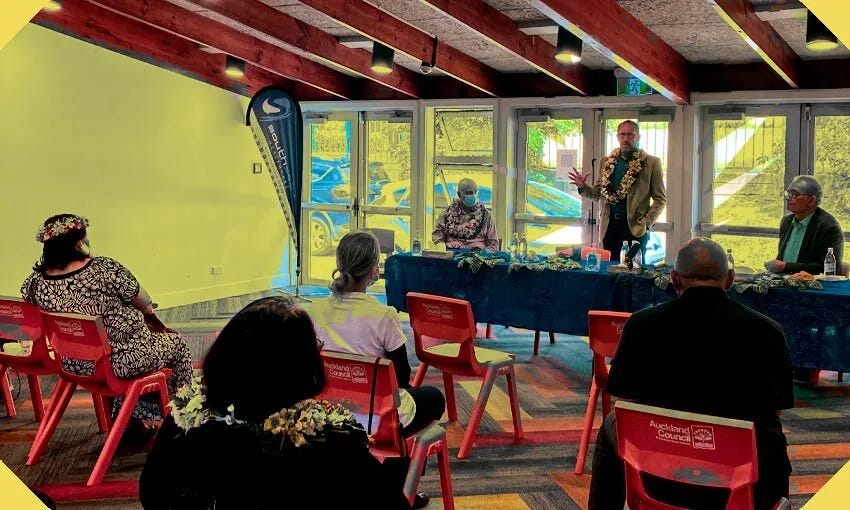Border to reopen to vaccinated travellers from January
Nearly two years after the managed-isolation system was created, fully vaccinated New Zealanders will be able to fly home over a three stage reopening plan next year
Mōrena and welcome to The Bulletin for Thursday, November 25, by Justin Giovannetti. Presented in partnership with Z Energy.
In today’s edition: Simon Bridges demoted over alleged misconduct; reserve bank hikes borrowing costs; agricultural emissions plan in trouble; but first, changes coming to the border.
New Zealand’s tough border restrictions will start coming down next year. (RNZ/AFP)
Opening up Fortress New Zealand. For the second year in a row there won’t be many Christmas reunions with overseas travellers. But in early 2022 the country’s borders will reopen in the most significant change to international travel since the start of the pandemic. From January 17, all fully vaccinated New Zealanders will be able to return from Australia, as long as they can provide a negative pre-departure test and self-isolate for seven days on arrival. They’ll need another negative test before re-entering the community. The old trans-Tasman bubble, where you could step off a plane into the country without restrictions, is over. RNZ has more on the plan, however, most of the details haven’t been firmed up yet.
The border will then open to the rest of the world in stages. On February 14, three weeks after flights resume from Australia, the border will open to further include New Zealanders returning from all countries. From April 30, the country will open to all fully vaccinated foreign nationals, however the testing and self-isolation requirement will remain, so mass tourism is unlikely. On self-isolation, Stuff reports Covid-19 minister Chris Hipkins saying friends and family coming to New Zealand and staying at your home can hang out with you during their isolation period, so they don’t actually need to stay locked up in a room. You don’t need to isolate after spending time together. It might sound counterintuitive, but that’s the plan.
Does this mean the end of MIQ? The government’s border facilities will still exist for New Zealanders who aren’t fully vaccinated and as insurance, in case of a worsening global situation, but this will mark the end of managed-isolation for most returnees. It’s also pretty hard to fly unvaccinated these days, so rooms should be more readily available than they are right now. The MIQ system became mandatory in April 2020 and nearly 190,000 people have been through it since then. After months of trying to get into the border system, often unsuccessfully, the move has been met by relief and frustration by New Zealanders overseas, The Guardian reports.
There’s also a change to countries considered very high risk. India, Pakistan, Brazil, Indonesia and Fiji are being taken off the list from early December. People will eventually be able to travel from those countries directly to New Zealand. Only one country will remain in the very high risk category: Papua New Guinea. The classification reflects a sobering fact about PNG: it has one of the lowest vaccination rates in the world. According to The Conversation, the country’s 1.7% vaccination rate isn’t due to a lack of vaccine, but a massive campaign of full-blown opposition to the jab.
Auckland has now been in lockdown for 100 days. The Spinoff has a helpful calendar with all the planned changes in the coming weeks and months, as the traffic light system is introduced, vaccine passes become mandatory, while internal and external borders are opened.
A message from The Spinoff’s new editor Madeleine Chapman:
Like any good door-to-door salesperson, I’m about to cheerily introduce myself and then, in the very next breath, ask you for money. Hi! I’m Madeleine (or Mad) Chapman, previously an intern at The Spinoff, then a staff writer, senior writer and now editor. It certainly wasn’t the plan to step into this role in the middle of a delta outbreak, nor did I think my first weeks on the job would unfold alongside New Zealand’s largest city slowly coming out of stagnation. But despite the strange and unfortunate circumstances, The Spinoff team has stepped up once again, working tirelessly (and mostly from our bedrooms) to bring you the most important news when you need it, and the lighter moments when things are looking a little bleak. We’ve been able to continue this work because of the ongoing contributions from our members and I can’t thank you enough.
But can I boldly ask that you consider becoming a member if you aren’t one already? If you’ve read something on our site recently that you enjoyed or appreciated, consider it a koha for that alone, because every dollar donated through The Spinoff Members is used to create more of the work you see every day. With Christmas around the corner (which I’m finding genuinely hard to believe), there’s no such thing as shipping delays on a membership of The Spinoff bought for whānau and friends.
Simon Bridges demoted by Judith Collins over alleged serious misconduct. The National leader has demoted Bridges and stripped him of all party portfolios over a complaint of a historical comment he made to a female MP, widely reported as a lewd comment at or near Jacqui Dean in 2017. Collins’ move, late Wednesday night, follows weeks of speculation that Bridges was about to challenge her for her job. Reporting from parliament last night, Tova O’Brien called the development “pure unbridled political mayhem.” Toby Manhire writes in The Spinoff that with Collins clearly on the way out. the party will need a new face after this latest tawdry episode.
The Covid numbers: There are 87 cases in hospital and 8 in ICU/HDU. There have been 7,484 cases in the delta outbreak. 181 new community cases were reported in Auckland yesterday, 18 in Waikato, 12 in Bay of Plenty, 3 in Northland and 1 in Canterbury. 18,880 people were vaccinated on Tuesday.
The Spinoff’s Covid data tracker has the latest figures.
Reserve Bank hikes borrowing costs again, faces criticism for not going harder. Last month, the central bank increased the official cash rate from a record low 0.25% to 0.5%. It was the first hike in seven years. Yesterday, it pushed it up again, to 0.75%. Mortgage rates have been climbing as a result. As Stuff reports, some economists wanted the bank to go to 1% due to the high level of inflation in New Zealand and around the world. They called the small increase “birdbrained”. Despite the criticism, it’s worth pointing out that nearly all major central banks aren’t anywhere near increasing rates, with some not expecting to make borrowing more expensive for years. New Zealand’s central bank isn’t unique, but it’s being closely watched right now.
Price on agricultural emissions won’t actually cut emissions, argues farm group. The government has been working on a plan to cut farm emissions with the industry, but two proposals released this week won’t actually do that. As Newsroom reports, modelling from He Waka Eke Noa also shows that putting farmers under the country’s ETS climate market wouldn’t cut emissions either. The details might explain why. The agriculture-led group expects it won’t need to pay a carbon price on 95% of its emissions. Environmental groups see the entire exercise as a failure and want the government to put 100% of farming emissions under the ETS immediately.
The government ‘failed us’ with rushed Covid-19 law, argues Geddis. Writing in The Spinoff, law professor Andrew Geddis said the government should have given proper time and scrutiny to the traffic light and vaccine pass bill that zoomed through parliament in less than 24 hours yesterday. National, Act and Te Paati Māori opposed the legislation. As Stuff reports, even Speaker Trevor Mallard was unhappy with the government using an urgency process he warned leads to “bad laws”. Along with the massive scope of the bill, the writing seemed rushed. Act noticed that the way it was written, a business is not legally allowed to advertise that its staff is fully vaccinated. It moved an amendment, the government shot it down. It’s now law.
KiwiRail’s chief executive quits, citing ‘distraction’ of media attention on bullying review. The move follows the decision, reported in yesterday’s newsletter, for the first strike in decades from KiwiRail workers to interrupt rail service. As RNZ reports, the government agency is currently undergoing an independent review into bullying allegations. Yesterday, former chief executive Greg Miller resigned, effective immediately, and cited the media’s reporting on the review as the reason why.
Got some feedback about The Bulletin, or anything in the news?
Get in touch with me at thebulletin@thespinoff.co.nz
Right now on The Spinoff: Justin Latif reports on planned changes to the Covid-19 health response being announced this morning. Mirjam Guesgen looks at why Nasa plans to crash a probe into an asteroid. Michelle Duff & Kirsty Johnston argue that it’s a great time to be a feminist in Aotearoa. Dylan Reeve investigates how Telegram became the extremists’ platform of choice in NZ. Chris Schulz explains why dozens of Bulgarian-New Zealanders were stopped from voting in a contentious election.
Vaccine hesitancy threatens Silver Ferns international schedule. RNZ reports that it might be nearly impossible to field a Silver Ferns team overseas due to unvaccinated members of the national squad. The team is confirmed to play in London in January for the Quad Series, but airlines won’t let people travel unless they are double-vaccinated. It’s unclear how many in the team aren’t vaccinated, but the window to change their minds and still travel is rapidly closing.
That's it for The Bulletin. If you want to support the work we do at The Spinoff, please check out our membership programme.







